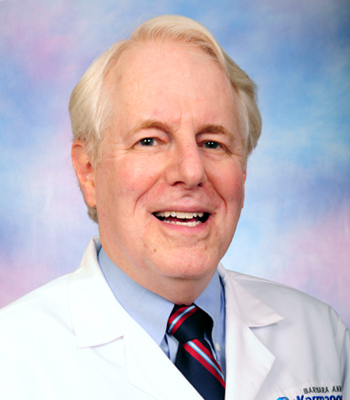Anthony Shields
Address
4100 John R., HW04HO Detroit, MI 48201Office address
4100 John R., HW04HO
Detroit, MI 48201
Department
Oncology
Research interests
- drug development using radiolabeled thymidine analogs, liposomes, and other drugs using PET
- imaging cellular proliferation and stress in vivo
- testing response to drug therapy for cancer
Research description
Drug Discovery and Development
The ultimate goal of our research is to understand the response of cancer to therapy using measurements of DNA synthetic pathways as imaged by positron emission tomography (PET). Ongoing studies have refined the techniques needed to obtain PET images with radiolabeled thymidine analogs, which are trapped in the DNA synthetic pathway. Studies that began in tissue culture and mice have now progressed to clinical trials. We have addressed a number of the problems associated with interpreting the PET images including the contributions to thymidine metabolism of intracellular pools, reutilization, and degradation. The most promising compound we have used to date is 18F-FLT (3'-deoxy-3'- fluorothymidine), which is an antiviral compound like AZT. It is trapped intracellularly after phosphorylation by thymidine kinase (TK) in a manner similar to the trapping of glucose analogs (FDG) after phosphorylation by hexokinase. This compound is stable to degradation and undergoes little metabolism, aside from glucuronidation. Studies in dogs and patients indicate that it readily visualizes proliferating organs such as the bone marrow, as well as tumors. Another analog, 18F-FMAU {1-(2'-deoxy-2'-fluoro-beta-D-arabinofuranosyl)-thymine} is being studied in cell culture, animals and humans. Our in human studies found that FMAU was readily retained in tumors, but not in normally proliferating bone marrow. FMAU is retained by the action of thymidine kinase 2 (TK2), a mitochondrial enzyme. We have found that increased retention reflects cellular stress. This is in contrast to FLT, which is retained by thymidine kinase 1 (TK1) the cytosolic enzyme associated with normal DNA synthesis. We are now testing the hypothesis that imaging cellular stress with 18F-FMAU may provide an early measure of cancer treatment response. Furthermore, FMAU may be simpler to use than agents being developed to image apoptosis, since the time course of stress may be more predictable than changes in apoptosis, which are often short term. These approaches will need to be validated against more conventional measures of response and biopsies based measurements of cell proliferation and TK activity. We are also studying labeled drugs to image their in vivo pharmacokinetics and pharmacodynamics. FAU {1-(2'-deoxy-2'-fluoro-beta-D-arabinofuranosyl)-uracil} is a chemotherapeutic agent which is in phase I testing. We conducted the first-in human phase 0 study of 18F-FAU to determine its suitability for imaging and to determine its potential as an antineoplastic agent. A phase I study using unlabeled FAU has started at Karmanos Cancer Institute and uses 18F-FAU and PET to monitor pharmacodynamics in tumors.
Selected publications
Puccini A, Poorman K, Salem ME, Soldato D, Seeber A, Goldberg RM, Shields AF, Xiu J, Battaglin F, Berger MD, Tokunaga R, Naseem M, Barzi A, Iqbal S, Zhang W, Soni S, Hwang JJ, Philip PA, Sciallero S, Korn WM, Marshall JL, Lenz HJ. Comprehensive Genomic Profiling of Gastroenteropancreatic Neuroendocrine Neoplasms (GEP-NENs). Clin Cancer Res. 2020;26:5943-51.
Spizzo G, Puccini A, Xiu J, Goldberg RM, Grothey A, Shields AF, Arora SP, Khushman M, Salem ME, Battaglin F, Baca Y, El-Deiry WS, Philip PA, Nassem M, Hall M, Marshall JL, Kocher F, Amann A, Wolf D, Korn WM, Lenz HJ, Seeber A. Molecular profile of BRCA-mutated biliary tract cancers. ESMO Open. 2020;5:e000682.
El-Deiry WS, Goldberg RM, Lenz HJ, Shields AF, Gibney GT, Tan AR, Brown J, Eisenberg B, Heath EI, Phuphanich S, Kim E, Brenner AJ, Marshall JL. The current state of molecular testing in the treatment of patients with solid tumors. CA Cancer J Clin. 2019;69:305-43.
Tokunaga R, Xiu J, Johnston C, Goldberg RM, Philip PA, Seeber A, Naseem M, Lo JH, Arai H, Battaglin F, Puccini A, Berger MD, Soni S, Zhang W, Hwang JJ, Shields AF, Marshall JL, Baba H, Korn WM, Lenz HJ. Molecular Profiling of Appendiceal Adenocarcinoma and Comparison with Right-sided and Left-sided Colorectal Cancer. Clin Cancer Res. 2019;25:3096-103.
Education/training
MD (1979): Harvard University, Massachusetts
PhD (1979): Massachusetts Institute of Technology, Massachusetts
